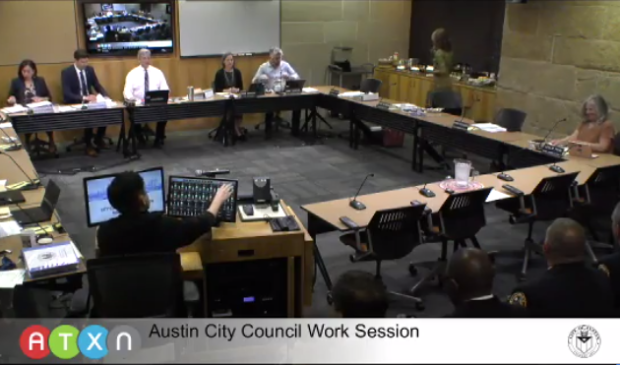Council lines up next steps to revise land use code
Wednesday, March 27, 2019 by
Ryan Thornton Austin City Council members came together Tuesday morning for a preliminary discussion about City Manager Spencer Cronk’s five big questions about the city’s land development code that he released in a memo earlier this month.
In the wake of the death of CodeNEXT, some Council members were clearly eager to jump back into the work of outlining specific policies. However, Cronk’s questions have forced a period of reflection so Council members can consider an array of possible solutions much like the ones offered to the 2014 City Council. More than four years later, Council is asked to choose how extensively the code should be revised. The options range from moving forward with a series of edits to the current code, all the way to the adoption of an entirely new code that goes beyond the changes detailed in draft three of CodeNEXT.
Brent Lloyd, an assistant city attorney who was also part of the CodeNEXT process, urged Council to consider how certain policies in the existing code have unexpected ripple effects. For example, Lloyd said, parking mandates not only affect walkability and transit viability, but directly impact the city’s housing capacity. Therefore, Lloyd said, because the current code functions as a system of interrelated policies, trying to solve the city’s housing and transportation problems with a series of updates could be very difficult compared to simply drafting a new document.
As Council voiced initial responses to the memo, Council members Greg Casar and Pio Renteria denounced the current land development code and its causal role in the city’s greatest challenges. “The environmental damage caused by sprawl and the displacement caused by us not meeting our housing goals” were at the top of Casar’s mind, while Renteria warned that public servants like teachers and firefighters are leaving the city and will begin finding work elsewhere if the lack of “missing middle” housing is not solved.
Naturally, Casar and Renteria wanted to get to work on the process as soon as possible. Their urgency was seconded by Mayor Pro Tem Delia Garza and Council members Ann Kitchen, Paige Ellis and Jimmy Flannigan, who said he arrived Tuesday ready for a detailed policy discussion.
Pushing back against that momentum, Council Member Alison Alter asked that everyone consider a document of shared goals dating back to February 2018, which she said still guides her thinking on the land development code. While Cronk’s memo highlights disagreements, she said, the goals document testifies to broad agreement on a variety of issues like wanting more residential options near commercial development.
While their conclusions may differ, most of the Council members also commented on the value of having gone through the process of trying to update the city code with CodeNEXT. Though Ellis had only “watched from the sidelines” during that process, she said it is also great for her to be able to refer to that background of what worked then and what didn’t.
Casar added that his answers to Cronk’s questions, too, will largely be informed by these experiences, both what was done well and what was not. He noted that CodeNEXT never went far enough to meet important goals like ensuring that 30 percent of new housing is accessible to a broad range of people.
Garza said that the history of CodeNEXT means the city already has a foundation laid to begin the next phase of work. “There has been a lot of work, a lot of community engagement, and I think we can build on that,” she said.
Taken from an informal suggestion by Kitchen, Council agreed that the memo will come back as an item on the April 9 work session agenda and then as an item for public comment at the April 11 City Council meeting. Finally, the item may return to Council for a vote on a resolution of direction to the city manager on April 25.
Alter said she took Kitchen’s suggestion more as a hypothetical scenario than as a realistic timeline, but didn’t object when Adler brought it up for consideration.
Flannigan also insisted that in the interim, Council get the conversation started on the City Council Message Board to avoid wasting more time, which Mayor Steve Adler agreed to organize.
Photo courtesy of ATXN.
The Austin Monitor’s work is made possible by donations from the community. Though our reporting covers donors from time to time, we are careful to keep business and editorial efforts separate while maintaining transparency. A complete list of donors is available here, and our code of ethics is explained here.
You're a community leader
And we’re honored you look to us for serious, in-depth news. You know a strong community needs local and dedicated watchdog reporting. We’re here for you and that won’t change. Now will you take the powerful next step and support our nonprofit news organization?



